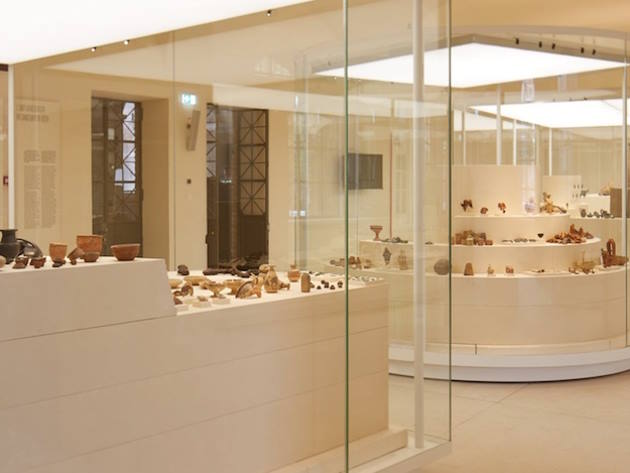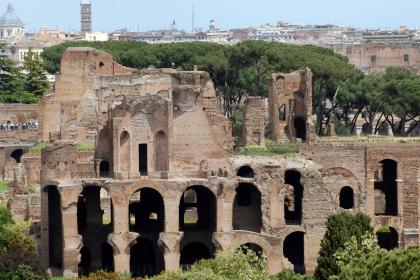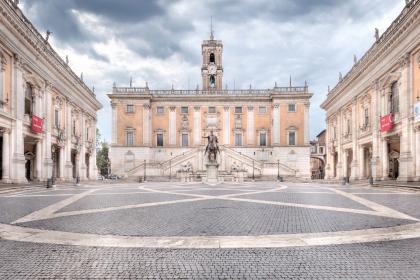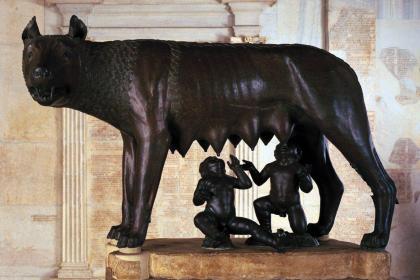
The new museum of the Roman Forum is located on the ground floor of the Cloister of Santa Maria Nova, in an exhibition itinerary that mainly brings together the contexts of the Roman Forum excavated by the archaeologist and architect Giacomo Boni in the early twentieth century.
The first Antiquarium of the Forum was established by Giacomo Boni in 1908 in the premises of the Convent of Santa Francesca Romana/Santa Maria Nova, built between 1492 and 1503 at the behest of Alexander VI to present to the public the results of the excavations conducted in those years in the area of the Roman Forum. The Antiquarium, originally made up of nine exhibition rooms, was supposed to become a cultural centre for research and studies; main feature was that, in the presentation of the archaeological materials displayed in the rooms, the integrity of the complexes brought to light was respected, in the belief that the individual finds retain their historical-archaeological value only if exhibited within the context of origin. Over time the Antiquarium collection was expanded with the display of materials recovered during the excavations and research of Dante Vaglieri, Alfonso Bartoli, Pietro Romanelli and Gian Filippo Carettoni.
The exhibition itinerary of the new Museum is divided into two rooms dedicated to the burial ground studied by Giacomo Boni in the years 1902-1905 in the area of the Temple of Antoninus and Faustina. During the archaeological investigations, forty-one tombs were excavated: four belonging to children relating to archaic dwellings (end of the 6th-5th century BC), twelve of children associated with huts dating back to the end of the 8th and 7th centuries BC. and twenty-five wells and pits dating back to the early Iron Age (approximately 10th century BC) and relating to the nucleus of burials present in this area before its use as a residential area. In this section you can observe in particular, next to a picture gallery with drawings by Giacomo Boni's collaborators, some tombs "set up" in display cases designed by the Venetian archaeologist and restored to their original colours. In the museum itinerary these tombs are displayed inside large bright glass chambers as they were at the time of discovery. These are cremation tombs dating back to the 10th century BC. approximately, with grave goods including gabled urn, hand-made miniature vases and various objects or grave burials from the same period.
In room 2 of the Museum, the marble statues of the two divine twins Castor and Pollux (the Dioscuri) are exhibited with their horses who, according to tradition, announced in Rome, at the Fonte Giuturna, the victory over the Latins in the Battle of the Lake Regillus (499 or 496 BC). Displayed here are a series of reliefs depicting the salient moments in the history of Rome from the Basilica Emilia, founded in 179 BC.
Room 3 of the Museum was dedicated to the sacred areas of the Roman Forum with large display cases, with finds mainly coming from Giacomo Boni's investigations: the Lapis Niger, the Equus Domitiani/Doliola and the Regia. A circular shrine, placed in the centre of the room, evokes the shapes of the aedes Vestae or the temple of Vesta. Inside the shrine, finds from the excavations of the Sanctuary of Vesta and the house of the Vestals were added, to which findings made by Alfonso Bartoli during subsequent excavations were added. The Hall also houses important finds belonging to the so-called votive deposit of the Capitoline clivus, excavated between the 1980s and 1990s by the Archaeological Superintendency of Rome.
The exhibition project and works management are by COR arquitectos (Cremascoli, Okumura, Rodrigues) with Flavia Chiavaroli.
Photo credits: courtesy of the Closseum Archaeological Park
The Roman Forum and the Palatine

 Condividi
Condividi
Piazza del Campidoglio (The Capitoline Hill)

 Condividi
Condividi
The Capitoline museums

 Condividi
Condividi
Information
segue gli orari del Foro RomanoChiuso 25 dicembreVisitabile con i biglietti:> 24h – Colosseo, Foro Romano, Palatino> Full Experience con accesso all'Arena del Colosseo> Forum Pass Super - Percorso di visita unitario Foro Romano-Palatino e Fori Imperiali
 Condividi
Condividi
Location
To find out about all accessibility services, visit the Rome accessible section.












































